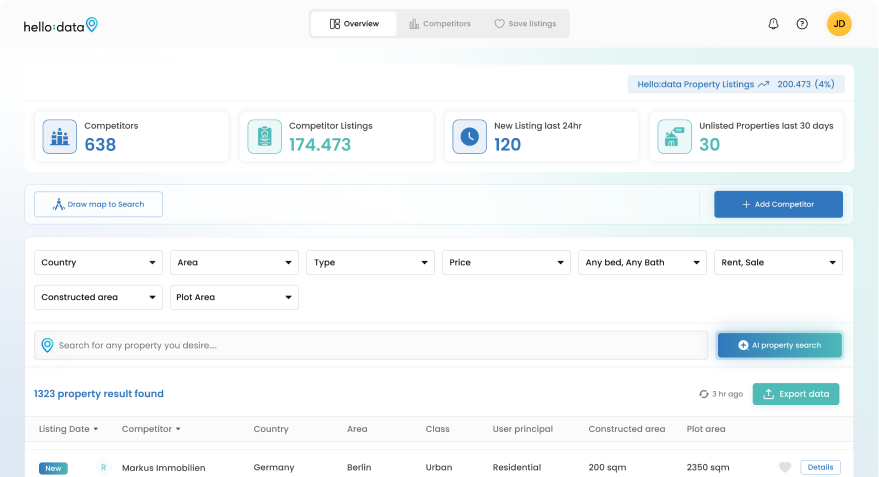Introduction
Investing in Spanish real estate presents a wealth of opportunities for foreign companies. Entering this market requires an understanding of its complexities. Hello Here SL stands at the forefront of this landscape, transforming property investment through innovative AI technology. Our platform, Hello Data Property Tracking, provides unparalleled access to real estate data, far exceeding traditional platforms such as Casafari and Idealista.
Key aspects to consider include:
- Legal Framework: Grasping Spain’s legalities is vital for smooth transactions.
- Market Dynamics: Familiarity with local trends enhances decision-making.
Understanding how to purchase property in Spain using a foreign company is essential for maximizing investment potential. The right knowledge empowers you to navigate challenges confidently.
In this guide, we will break down critical steps and insights tailored for foreign investors, ensuring you are well-equipped to make informed decisions in 2024 and beyond. By leveraging advanced resources like Hello Here SL, you’ll be positioned to capitalize on lucrative real estate opportunities while ensuring compliance with all regulations.
For instance, if you’re interested in a newly constructed residence in Cala Romantica, understanding the valuation process can significantly enhance your investment strategy. We will also provide insights into different approaches to value real estate, which can be found in our comprehensive guide on 3 approaches to value real estate.
1. Understanding the Legal Framework and Tax Implications
Investing in Spanish real estate requires a solid grasp of legal considerations and tax implications. Foreign companies can purchase property in Spain through various structures, including direct acquisition or forming a local entity. The process is streamlined but demands attention to detail.
Key Points for Foreign Companies:
- Property Purchase Process:
- Foreign companies must provide necessary documentation, such as the company’s registration details and identification numbers.
- A notary will oversee the transaction to ensure compliance with Spanish law, safeguarding both parties.
- Tax Advantages:
- Companies without a Permanent Establishment (PE) may enjoy certain tax benefits, including exemptions on some local taxation.
- For entities with a PE, different tax obligations apply, often resulting in higher compliance requirements.
Corporate Tax Rates:
- EU vs. Non-EU Companies:
- EU-based companies generally face more favorable corporate tax rates compared to their non-EU counterparts.
- The effective corporate tax rate is approximately 25% for resident companies. However, variations occur depending on specific circumstances and fiscal agreements in place.
Understanding these legal frameworks and tax implications is crucial for making informed decisions. Knowledge of how to navigate regulations not only enhances compliance but also optimizes investment returns.
As you consider investing in locations like Mallorca, being equipped with this knowledge empowers you to capitalize on opportunities while minimizing risks associated with foreign investment in real estate. Whether you’re looking at a charming countryside finca near Andratx, a newly constructed home in Cala Romantica, or an impeccably maintained villa in Nova Santa Ponsa, understanding the legal and tax landscape will significantly enhance your investment strategy.
2. Preliminary Steps for Property Purchase in Spain
Investing in Spanish real estate, such as a brand new villa under construction in Sol de Mallorca, requires careful preparation and understanding of your company’s legal standing.
Review Company Bylaws
Before initiating a property purchase, examine your company bylaws. This ensures that the acquisition aligns with your corporate objectives and governance structure. Confirm that property investment is permitted within your company’s framework to avoid future complications.
Obtaining Essential Identification Numbers
Two critical identification numbers are necessary for foreign companies:
- Número de Identificación de Extranjero (NIE):
- This identification number is crucial for any foreign entity engaging in property transactions in Spain.
- The process involves submitting an application at a police station or through the Spanish consulate abroad.
- Required documents typically include:
- A valid passport
- Completed application form (EX-15)
- Proof of the reason for obtaining the NIE (property purchase intention)
- Código de Identificación Fiscal (CIF):
- This tax identification code is essential for taxation purposes.
- Apply through the Spanish Tax Agency (Agencia Tributaria) to ensure compliance with local tax laws.
- Key documents needed include:
- Company bylaws
- Proof of registration in your home country
- NIE of the representative acting on behalf of the company
Registration Requirements with the Spanish Tax Agency
Registering with the Spanish Tax Agency is non-negotiable for all foreign entities pursuing real estate investments.
- Ensure you provide:
- A completed form 036/037
- Evidence of your business activities
- Documentation verifying your company’s identity and representative.
Completing these preliminary steps establishes a firm foundation for further transactions, ensuring compliance with local regulations and enhancing your investment’s security in Spain’s vibrant real estate market. Whether you’re interested in a stunning modern villa offering luxury in Port Andratx or a villa with stunning sea view and legal vacation rental license, understanding these steps will significantly smoothen your property acquisition process.
3. Banking Requirements and Financial Compliance for Foreign Companies
When investing in Spanish real estate, establishing a Spanish bank account is essential. This account facilitates property transactions and ensures compliance with local financial regulations. The process of opening a bank account in Spain can vary among banks, but it generally includes several key steps and documentation.
Required Documentation
To successfully open a Spanish bank account, foreign companies must present specific documents, including:
- Legalized Company Documents: These should include your company’s articles of incorporation and any other relevant legal paperwork that verifies your business structure.
- Número de Identificación de Extranjero (NIE): This unique identification number is crucial for any foreigner conducting business or property transactions in Spain.
- Código de Identificación Fiscal (CIF): This tax identification code is necessary for corporate entities operating within Spain.
Once these documents are gathered, approach a local bank to initiate the account opening process. It’s advisable to choose a bank that has experience working with international clients and understands the unique challenges faced by foreign investors.
Importance of Compliance
Having a dedicated Spanish bank account does more than simplify transactions; it also ensures adherence to financial regulations. Banks will typically request proof of the source of funds being used for the investment, which reinforces transparency and mitigates risks associated with money laundering.
By maintaining a Spanish bank account, companies can streamline their transactions related to property purchases. This includes managing payments such as deposits, notary fees, and taxes efficiently. Given the evolving landscape of real estate investment in Spain, understanding these banking requirements is vital for navigating the complexities involved in property acquisition.
Understanding how to purchase property in Spain using a foreign company requires diligence in meeting these banking prerequisites. Ensuring compliance not only protects your investment but fosters trust with local authorities and financial institutions.
4. Appointing a Tax Representative in Spain
Navigating tax compliance in Spain is essential for foreign companies, particularly those without a Permanent Establishment (non-PE companies). Understanding the role of a tax representative is crucial for ensuring adherence to local tax laws.
Role of a Tax Representative
A tax representative serves as an intermediary between the non-PE company and the Spanish tax authorities. Key responsibilities include:
- Tax Filing: Ensuring timely submission of required tax returns and compliance with fiscal obligations.
- Communication: Acting as the primary contact for any inquiries or audits from the tax office.
- Expertise: Providing guidance on local tax regulations and any changes that may impact your investment.
Benefits of Appointing a Tax Representative:
- Mitigates risks associated with non-compliance.
- Simplifies the process of understanding complex Spanish tax laws.
- Enhances credibility with local authorities.
Joint Liability Implications for PE Companies
For companies established as Permanent Establishments in Spain, joint liability concerning tax obligations comes into play. This means:
- Shared Responsibility: Both the company and its representatives may be held liable for unpaid taxes or failures to comply.
- Enhanced Scrutiny: PE companies face increased regulatory oversight, making it imperative to maintain thorough documentation and timely filing practices.
Understanding these implications ensures that foreign businesses are not only compliant but also protected against potential legal challenges arising from mismanaged tax responsibilities. Engaging professionals familiar with Spanish tax law reduces uncertainty and empowers businesses to focus on their core operations without distraction.
With proper representation and knowledge of obligations, foreign investors can navigate the complexities of investing in Spanish real estate confidently.
5. The Property Acquisition Process Explained Step-by-Step
Investing in Spanish real estate involves a defined acquisition process. Understanding each step is crucial for a seamless transaction.
1. Reservation Contract
The first step is signing a reservation contract to secure the property of interest. This document outlines the terms of the agreement, including purchase price and intended completion date.
A deposit, typically 10% of the property price, is paid at this stage. This amount demonstrates your commitment and can be forfeited if you back out of the deal without valid reasons.
2. Due Diligence
After the reservation contract, conduct thorough due diligence on the property. This includes verifying ownership, checking for outstanding debts or liens, and ensuring compliance with local regulations.
3. Finalizing the Sale
The next phase involves finalizing the sale through a public deed before a notary public. This notary plays a vital role in ensuring that all legal requirements are met during the transaction.
Both parties must provide necessary documentation, such as identification and proof of financial capability.
4. Registration at Land Registry
Once the public deed is signed, you must register it at the Land Registry (Registro de la Propiedad). This step officially records your ownership and protects your rights as a property owner.
Registration costs may vary but typically range from 1% to 2.5% of the property’s value.
5. Post-Acquisition Responsibilities
After registration, understanding ongoing responsibilities becomes essential. Familiarize yourself with local property taxes and any obligations related to property maintenance or community fees.
Additionally, you might want to consider utilizing a lease rent optimizer for smarter property management in Spain.
Navigating these steps offers clarity in acquiring real estate in Spain. Each phase requires attention to detail and compliance with legal standards, ensuring a successful investment journey in this vibrant market.
6. Understanding Tax Obligations When Investing in Spanish Real Estate
Investing in Spanish real estate comes with a set of tax obligations that foreign companies must navigate. Here’s an overview of the key taxes relevant to property acquisition:
1. Transfer Tax (Impuesto de Transmisiones Patrimoniales – ITP)
This tax applies when purchasing resale properties. Rates range from 6% to 10% depending on the region in Spain. Each autonomous community sets its own rates, so it’s crucial to check the specific applicable rate for your target area.
2. Value Added Tax (VAT – IVA)
For new properties, VAT is levied at a flat rate of 10%. This tax applies to residential properties purchased from developers. It’s essential to factor this into your budget as it can significantly impact the overall cost.
3. Stamp Duty (Actos Jurídicos Documentados – AJD)
Applicable when signing the public deed of sale, this tax ranges from 0.5% to 1.5%, based on the property’s value and the region.
4. Ongoing Local Property Taxes
After acquiring property, expect to pay local taxes such as:
- Property Tax (Impuesto sobre Bienes Inmuebles – IBI): An annual tax calculated based on the cadastral value of your property.
- Garbage Collection Tax (Tasa de Basura): Varies by municipality and is typically charged annually.
Being aware of these taxes is vital when planning your investment strategy in Spain’s real estate market. Understanding each component will help you prepare financially and avoid unexpected costs during and after the purchase process.
Moreover, understanding how technology is transforming real estate transactions can be beneficial. For instance, OCR technology is revolutionizing how documents are processed in real estate, making transactions smoother and more efficient. Additionally, exploring SOFR can provide insights into its impact on financing options for property investments.
For a comprehensive understanding of how to purchase property in Spain using a foreign company, explore our 2024 Expert Guide. This resource provides essential insights and tips tailored for foreign investors navigating the Spanish real estate landscape.
7. Rental Considerations and Compliance with Local Regulations
Investing in property for rental purposes in Spain presents lucrative opportunities. Understanding the importance of obtaining tourist rental licenses for short-term rentals is crucial. These licenses not only legitimize your rental operations but also ensure compliance with regional regulations. Each autonomous community in Spain has specific laws governing short-term rentals, reflecting local market conditions and tourism strategies.
Key Points on Tourist Rental Licenses:
- Mandatory Requirement: Most regions require a tourist rental license to legally operate short-term rentals. Failing to obtain this can lead to hefty fines and restrictions.
- Application Process: The process often involves submitting documents that prove compliance with safety standards, zoning laws, and property usage regulations.
- Periodic Renewals: Licenses may need renewal every few years, depending on local regulations. Staying updated on these requirements is essential.
Adhering to local regulations when renting out properties safeguards your investment and enhances its profitability. Regulations may cover various aspects, including:
- Safety Standards: Properties must meet specific health and safety requirements, such as fire safety measures and adequate sanitation facilities.
- Noise Restrictions: Many municipalities enforce rules regarding noise levels to maintain neighborhood harmony, particularly during nighttime hours.
- Advertising Compliance: Ensure that all advertisements accurately reflect the property’s features and comply with local marketing regulations.
Non-compliance with these regulations can result in penalties or even the revocation of your rental license. Establishing a strong foundation of legal adherence not only protects your business but also builds trust with potential guests.
Engaging with local authorities or real estate professionals familiar with the area can provide invaluable insights into navigating these regulatory landscapes efficiently. Understanding these facets of Spanish real estate investment empowers you to make informed decisions while maximizing your rental income potential.
8. Anticipating Costs Involved Beyond Purchase Prices
Investing in Spanish real estate entails various costs that extend beyond the property’s purchase price. Understanding these expenses enables foreign companies to budget effectively and avoid unexpected financial strains. Key costs to consider include:
- Notary Fees: Typically range from 0.1% to 0.5% of the property value, depending on the complexity of the transaction. Notaries play a crucial role in formalizing property transactions, ensuring legal compliance, and safeguarding both parties’ interests.
- Title Deed Tax: This tax varies based on the autonomous community but generally falls between 6% and 10% of the purchase price for resale properties. New properties may incur VAT instead, currently set at 10%.
- Land Registration Fees: Required for registering the property with the Land Registry, these fees can vary between 1% and 2.5% of the property’s value. Proper registration is vital for establishing ownership.
- Legal Fees: Engaging a lawyer familiar with Spanish real estate law is essential. Legal fees typically amount to around 1% to 2% of the property’s purchase price, covering contract reviews, negotiations, and ensuring compliance with local regulations.
- Ongoing Local Property Taxes: After acquisition, property owners must pay annual local taxes which can vary significantly based on location and property type. These taxes contribute to local services and infrastructure.
Anticipating these additional costs is crucial for effective financial planning. Hidden costs often surface during transactions, leading to potential frustration or budget overruns. By preparing for these expenses in advance, foreign companies can navigate the Spanish real estate market with confidence and clarity.
9. Market Insights on Spanish Real Estate Investment Opportunities
Understanding property prices across Spain is crucial for making informed investment decisions. Here’s an analysis of how prices per square meter vary across different cities:
Price Variation Across Major Cities
- Madrid: The capital city boasts some of the highest property prices, averaging around €3,500 per square meter. Factors such as a strong job market and vibrant cultural scene drive demand.
- Barcelona: Close behind Madrid, Barcelona’s prices average approximately €3,200 per square meter. The city’s appeal lies in its architecture and coastal lifestyle.
- Valencia: A more affordable option, Valencia offers properties at about €1,800 per square meter. Its growing expat community and economic development make it an attractive destination for investors.
- Seville: Prices here average €2,000 per square meter. Known for its rich history and cultural appeal, Seville presents opportunities for both residential and tourist rental investments.
- Malaga: This coastal city averages €2,500 per square meter. With its beautiful beaches and favorable climate, Malaga has become a hotspot for foreign buyers seeking vacation homes.
To make the most of these investment opportunities, conducting a comparative market analysis is essential. This process helps investors understand the market better by analyzing similar properties in the area.
Factors Influencing Investment Decisions
Factors influencing investment decisions include:
- Market Trends: Continuous monitoring of price trends helps identify the best times to invest. Recent years have shown steady growth in major cities.
- Economic Indicators: GDP growth rates, unemployment statistics, and foreign investment levels provide insight into market stability.
- Regulatory Environment: Understanding local laws can impact investment strategies. Foreign companies must navigate various regulations that may affect property ownership.
Monitoring these elements equips foreign companies with the insights needed to capitalize on opportunities within the Spanish real estate market. Knowledge of local dynamics ensures strategic decision-making when exploring “How to Purchase Property in Spain Using a Foreign Company: 2024 Expert Guide.”
10. Visa Options Available for Foreign Investors in Spain
Investing in Spanish real estate opens pathways to various visa options, allowing foreign investors to enjoy the benefits of residency in Spain.
Golden Visa Program
The Golden Visa program is specifically designed for non-EU nationals who invest a minimum of €500,000 in Spanish real estate. This program offers several advantages:
- Immediate Residency: Investors and their families can obtain residency permits, allowing them to live in Spain and travel within the Schengen Area.
- No Minimum Stay Requirement: Unlike other residency permits, the Golden Visa does not impose strict stay requirements, making it flexible for business owners.
- Pathway to Citizenship: After ten years of residing in Spain, investors may apply for Spanish citizenship, provided they meet certain criteria such as language proficiency and integration into society.
Other Residency Options
In addition to the Golden Visa, there are other residency options based on different investment criteria:
- Non-Lucrative Visa:
- For individuals with sufficient financial means to support themselves without engaging in work activities in Spain.
- Requires proof of income or savings, typically covering a minimum threshold set by the Spanish government.
- Startup Visa:
- Aimed at entrepreneurs wishing to start innovative business ventures in Spain.
- Applicants must present a viable business plan and demonstrate potential economic impact.
- Work Visa:
- For foreign nationals who secure employment offers from Spanish companies.
- Requires sponsorship from an employer and compliance with labor regulations.
- Student Visa:
- For individuals enrolling in educational programs at accredited institutions.
- Offers opportunities for part-time work under specific conditions.
These visa options not only facilitate a smooth transition to living in Spain but also enhance the attractiveness of investing in its real estate market. Understanding these pathways empowers foreign investors to make strategic decisions aligned with their long-term goals while enjoying life in a vibrant country.
How Hello Here SL Revolutionizes Property Investment with AI Technology
Hello Here SL is changing the way people invest in real estate with its AI-powered app called Hello Data Property Tracking. This app is designed to help investors, especially foreign companies, navigate the process of buying property in Spain more easily and efficiently.
Surpassing Traditional Platforms
For years, platforms like Casafari and Idealista have been the go-to options for property searches. However, Hello Data Property Tracking offers something different:
- More Listings: While Idealista has around 24,000 properties listed in Mallorca, Hello Data has an impressive 82,000 listings. This means investors have access to a wider range of options.
- Metasearch Capabilities: With this feature, users can search for properties across multiple websites at once, saving them time and effort.
Enhancing Property Search Efficiency
AI plays a crucial role in making the property search process faster and more effective. Here’s how:
- Personalized Recommendations: The app uses machine learning algorithms to understand user preferences and suggest properties that match their criteria.
- Rapid Analysis of Market Trends: Investors can stay informed about current market conditions through real-time data analysis, helping them make better decisions.
Comprehensive Support for Foreign Companies
Investing in Spanish real estate can be challenging for foreign companies due to legal complexities and unfamiliarity with the local market. Hello Here SL aims to address these challenges by providing support throughout the entire investment journey:
- Legal Compliance Guidance: The platform offers resources and information on legal requirements specific to property investment in Spain.
- Finding Lucrative Deals: By leveraging AI’s power, the app highlights profitable investment opportunities based on user-defined criteria.
- Integration with Local Experts: Users have access to local professionals who assist with negotiation processes and due diligence.
- Continuous Updates and Alerts: Investors receive real-time notifications about new listings or changes in the market that could impact their investments.
This holistic approach not only empowers foreign companies but also positions Hello Here SL as a leader in the evolving landscape of property investment technology. By combining legal compliance with cutting-edge technology, Hello Here SL opens doors to a wealth of opportunities for international investors looking to navigate the Spanish real estate market efficiently.
For those interested in exploring rental units more effectively on MLS and ILS platforms, our insights on AI property search will prove valuable.
In addition, we provide a comprehensive comparison between our services and other platforms like YieldStar LRO and AIRM in our detailed AI property search showdown, which showcases the unique advantages of using our platform over traditional ones.
Moreover, if you’re considering unconventional investment strategies such as purchasing mother-daughter houses, we have compiled an insightful guide on this topic which you can find here.
Conclusion: Making Informed Decisions as a Foreign Investor in Spanish Real Estate
Navigating the Spanish real estate market requires a clear strategy and informed decisions. Here are key steps to consider:
- Consult Legal and Tax Professionals
- Engage experts who understand local regulations and tax implications. Their guidance is invaluable in forming a robust real estate investment strategy.
- Leverage Technology
- Utilize platforms like Hello Here SL for enhanced efficiency. With advanced algorithms, you can streamline property searches, ensuring compliance while optimizing your investments.
- Stay Informed
- Keep updated on market trends and legal requirements. Knowing how to purchase property in Spain using a foreign company is essential for success in 2024.
By combining expert advice with innovative technology, foreign companies can make strategic investments in Spanish real estate. The right tools and knowledge empower you to seize lucrative opportunities confidently.









